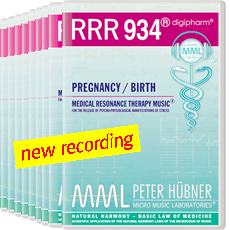| peter hübner • micro music laboratories |
| M E D I C A L R E S O N A N C E T H E R A P Y M U S I C® |
| R E D U C T I O N O F P S Y C H O – P H Y S I O L O G I C A L M A N I F E S T A T I O N S O F S T R E S S |
Scientific Studies and Clinical Observations
- Faster normalization of excessively high blood pressure in pregnant women with mild OPH syndrome than in the medication group
- Significant reduction in the number of premature births – from 14% down to 6,2% – since the introduction of treatment with Medical Resonance Therapy Music® for pregnant women facing the risk of miscarriage
- Faster breakdown of the protein content in the urine of pregnant women with OPH syndrome
- Significantly better development of the kariopicnotic index in pregnant women facing the risk of miscarriage than in the control group and, as a result, a significantly better pregnancy
- Dispersion of the clinical risk characteristics in pregnant women with a threat of miscarriage:
after 2-3 days there were no longer any clinical risk characteristics in 60% of the women, in 100% after 5-7 days. In the control group: the clinical risk characteristics had disappeared in 70% after 7-10 days, in 30% there was no complete dispersion of the risk characteristics
- Improvement in the foetal heart activity in pregnant women with OPH syndrome: 20 – 30% faster than in the control group
- Significant improvement in the hormone status in pregnant women with somatic disorders leading to a significant increase in the well-being of mother and child, compared to only minor improvement in the control group
- Taking of foetal heart activity out of the danger zone to a very satisfactory condition
- Calming of the child inside the mother’s body during labor
- Improvement of uterine activity: increased strength and a more harmonic rhythm
of uterine contractions in women with an initial inactivity of the uterus during labor.
- Reduction of anxiety during labor.
- Reduction of pain during labor.
- Reduction of hormonal manifestations of stress during labor.
- Improvement of the general mental state in women with a mild OPH-syndrome.
- Improvement of restless and depressive states in pregnant women with a threatening loss of pregnancy: in 69,2% of the women a total normalization of the psychic state occurred, no woman showed an aggravation of these symptoms. The results of the control group: in 40% a complete normalization, in 40% a further aggravation of the state.
- Improvement of the immune status of pregnant women diagnosed for a threatening miscarriage: after the treatment the percentage of healthy women was 55% versus 46% in the control group.
- Faster recovery of pregnant women with an OPH-syndrom: by 14% faster than in the control group.
- Reducing the frequency of headache attacks in pregnant women from 73% to 20%.
In the control group an increase from 60% to 70%.
- Improvement of sleep in 77% of the pregnant women with a mild form of the OPH syndrome.
- Improvement of sleep in 77% of the pregnant women with a mild form of the OPH syndrome.
Reducing the frequency of sleep disorders from 86% to 7%. In the control group an increase from 50% to 80%.
- Reduction of psycho-emotional stress by 47% versus no reduction in the control group.
- Almost complete elimination of the risk factor stress in pregnant women: reducing the stress hormone cortisol by 36% while at the same time doubling the hormone progesterone.
If you want to look at the studies in detail, please visit:
